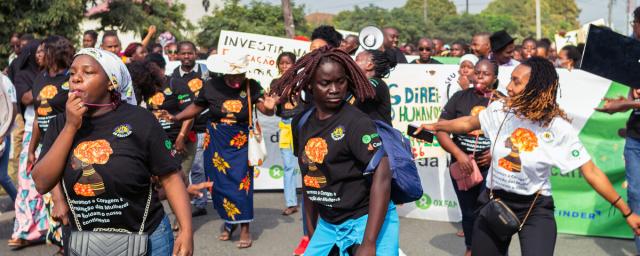
Feminist batucada march in honor of African Women's Day. (Photo: Rosário Matateu/Oxfam)
Mozambique, officially the Republic of Mozambique, is located in Southeast Africa and is endowed with rich and extensive natural resources, although the country's economy is based chiefly on fishing and agriculture. Tourism is expanding rapidly.
However, Mozambique confronts a complex nexus of humanitarian and developmental emergencies, characterized by cyclical climate-induced catastrophes, macro-economic precariousness, and poor human rights enjoyment, coupled by conflicts.
Oxfam endeavors to mitigate these challenges through strategically designed interventions that empower local communities and cultivate durable, equitable and sustainable development outcomes.
Challenges
Mozambique grapples with persistent humanitarian crises exacerbated by climate change and human induced conflicts, such as cyclones, droughts, and flooding as well as armed insurgencies, which disrupt livelihoods and displace communities. Despite economic high-value natural resources, economic challenges - including high inflation, poor infrastructure, poverty, and limited access to essential services - further hinder development efforts. The country also faces governance issues that restrict civic space and limit participation in decision-making processes for women, young people, and the LGBTQIA+ communities.
Despite these challenges, there are opportunities for growth, particularly in enhancing community resilience and promoting gender equality. Strengthening institutions and local capacities and fostering partnerships can lead to more effective responses to ongoing crises and long-term development goals.
Impact on People
The compounded effects of climate-related disasters, conflicts and economic instability have severely impacted Mozambique. Women and children often bear the brunt of these challenges, facing increased risks of food insecurity, displacement, and gender-based violence. Limited access to education and healthcare exacerbates the issues, and families struggle to meet their basic needs, perpetuating cycles of poverty and inequality.
Oxfam’s Role
Oxfam started operations in Mozambique in 1978. We continue to play a crucial role by implementing programs focused on humanitarian action, gender justice, climate, fiscal and economic justice. Priorities include strengthening local capacities for disaster risk management and strengthening productive and climate adaptive capacities, advocating for fair resource governance, and promoting women’s leadership in decision-making processes.
By promoting local humanitarian leadership and leveraging partnerships with local organizations, Oxfam aims to create sustainable solutions that enhance resilience and improve the lives of marginalized communities.
Looking Ahead
We need to advocate for increased investment in infrastructure, education, and health economic services, including governance of natural resources, alongside continued support for local governance and accountability mechanisms. Strengthening community adaptive capacities and resilience through targeted interventions will be vital in mitigating the impacts of future crises and ensuring sustainable development for people in Mozambique.